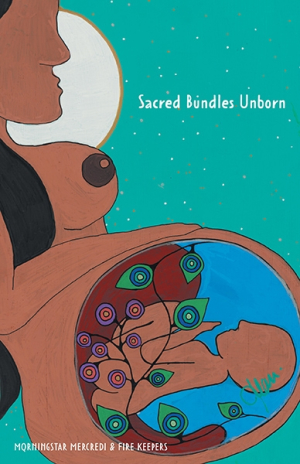Sacred Bundles Unborn
With a keen sense of human dignity, Sacred Bundles Unborn balances horrific accounts of forced sterilization with academic analyses.
Edited by Morningstar Mercredi, the powerful essay collection Sacred Bundles Unborn presents a variety of views on the forced sterilization of Indigenous women in Canada and elsewhere.
The legacy of European colonialism in the Americas left indelible marks on the bodies of Native women, with hundreds of thousands of documented cases of forced and coerced sterilizations coming to light in recent decades. In order to explore the complexities of these traumatic experiences, this volume employs a variety of methods and styles, including personal narratives in many cases, but also poems and artwork alongside academic facts. Many of its contributors are Indigenous, but some are settlers who explain how they attempt to use their privilege to bring attention to this important issue. Midwives, doctors, lawyers, and scholars all contribute perspectives on the history and lived experiences of reproductive injustices.
The first-person narratives make these experiences stark and graphic: Mercredi writes about being raped as a teenager and seeking medical treatment during the pregnancy, at which time her baby was taken by cesarean, and her left ovary and fallopian tube were removed without her consent. Similarly, Alisa R. Lombard recounts microaggressions doctors aimed at her during her pregnancies for being Native, and the psychiatric break that she suffered after a second childbirth when postpartum depression crept in. Lombard’s chapter combines a personal narrative with legal analysis of informed consent, and the various ways in which coerced and forced sterilizations are carried out, despite their very existence being a violation of basic human rights. These chapters establish forced sterilization as a mechanism of genocide, one which has continued into the 2000s, and one which the end notes help document with precision.
Outsiders provide poignant reflections, too. Ewan Affleck, a settler doctor, recounts how he and his pregnant wife traveled on government dime to be near their families while his wife gave birth, while many of his Inuit patients were forcibly separated from their families when time came to give birth. Peruvian Indigenous woman Victoria Saccsara endured forced sterilization in the 1990s along with hundreds of thousands of her countrywomen; in her chapter, she tells of the challenges she faces: ongoing health problems, the inability to work, and hurdles in organizing activism so that these wrongs can be addressed.
Beautiful artwork and evocative poetry adorn the book’s pages, and each contributor appears at the book’s end with a photograph and a short biography, helping to humanize the contributors who have, in many cases, been on the receiving end of human rights abuses. This blend of scholarly and personal tones ensures the book’s ability to makes its points across multiple modes of understanding.
Sacred Bundles Unborn balances horrific and moving first-person accounts of forced sterilization in Canada and elsewhere with academic analyses of these events, with a call to acknowledge and protect human dignity everywhere.
Reviewed by
Jeana Jorgensen
Disclosure: This article is not an endorsement, but a review. The publisher of this book provided free copies of the book and paid a small fee to have their book reviewed by a professional reviewer. Foreword Reviews and Clarion Reviews make no guarantee that the publisher will receive a positive review. Foreword Magazine, Inc. is disclosing this in accordance with the Federal Trade Commission’s 16 CFR, Part 255.

